Abstract
No. 21 mycobacterial antigens of Mycobacterium lepraemurium, M. avium, M. fortuitum, and M. leprae were compared in crossed immunoelectrophoresis using two different antibody sources, a serum pool from lepromatous leprosy patients (LSII) and a rabbit anti-M. smegmatis antiserum. M. lepraemurium, like M. avium, was found to contain the 21 A and 21 C determinants. M. fortuitum contained in addition a new type of determinant, 21 D.M. leprae antigen no. 21 carried the A as well as the B dertminants, the latter found so far only in the leprosy bacillus. The separate taxonomic position of M. leprae, suggested by earlier studies of the no. 21 antigen, is further supported by the present results, which also demonstrate the potential use of submolecular heterogeneity for such investigations.
Full text
PDF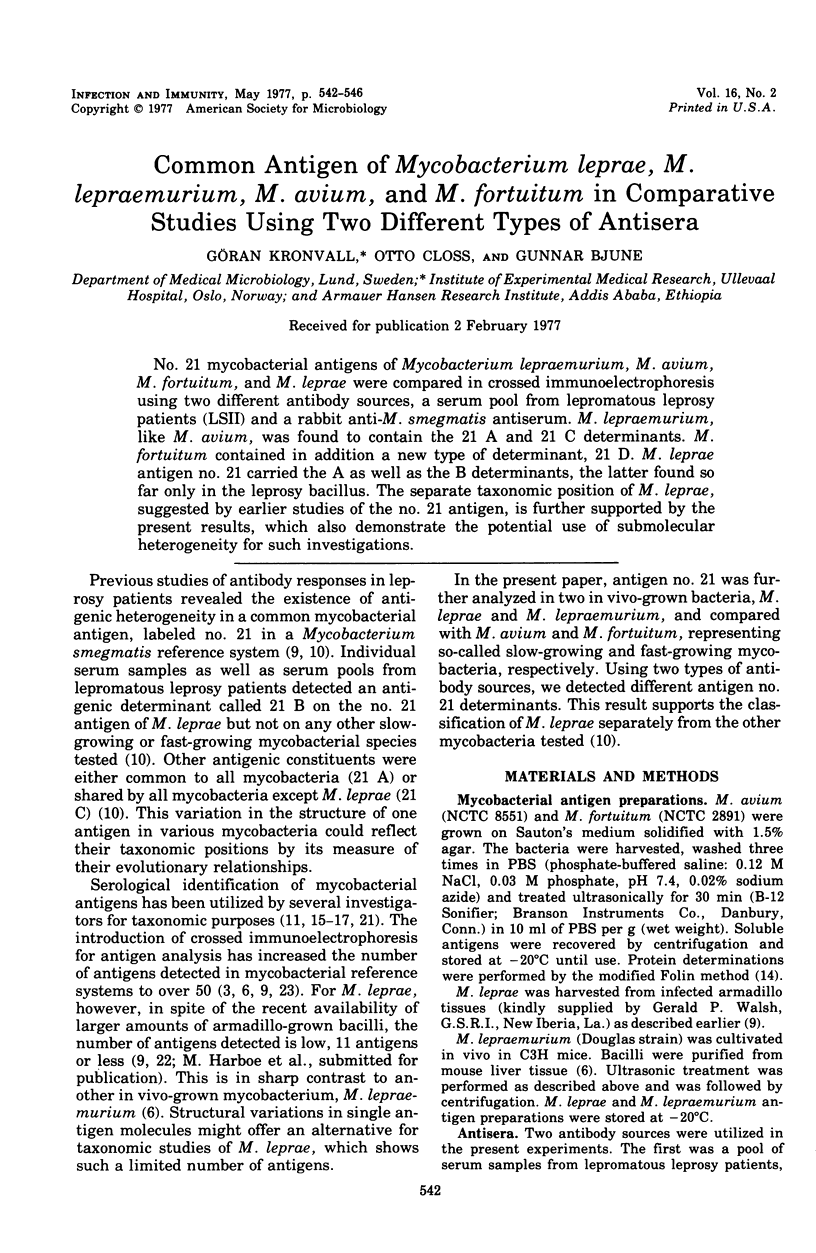
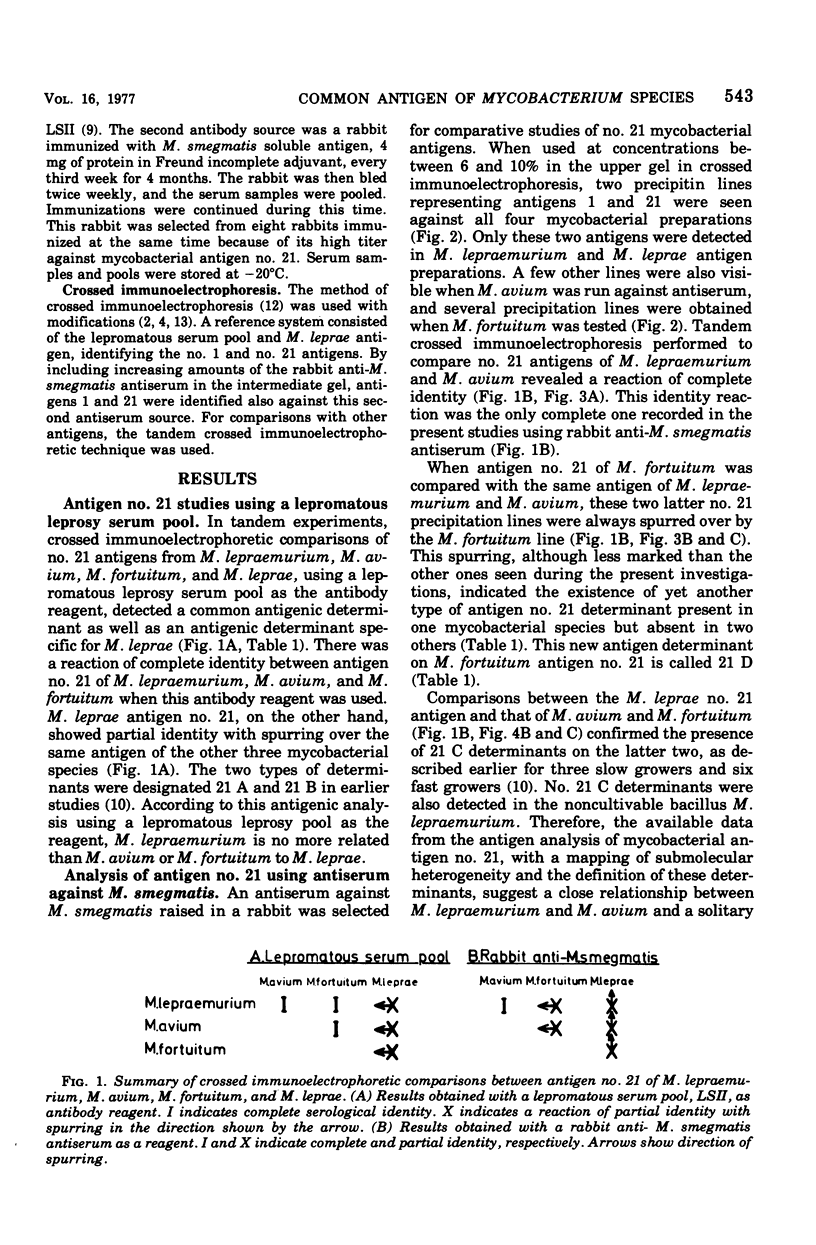
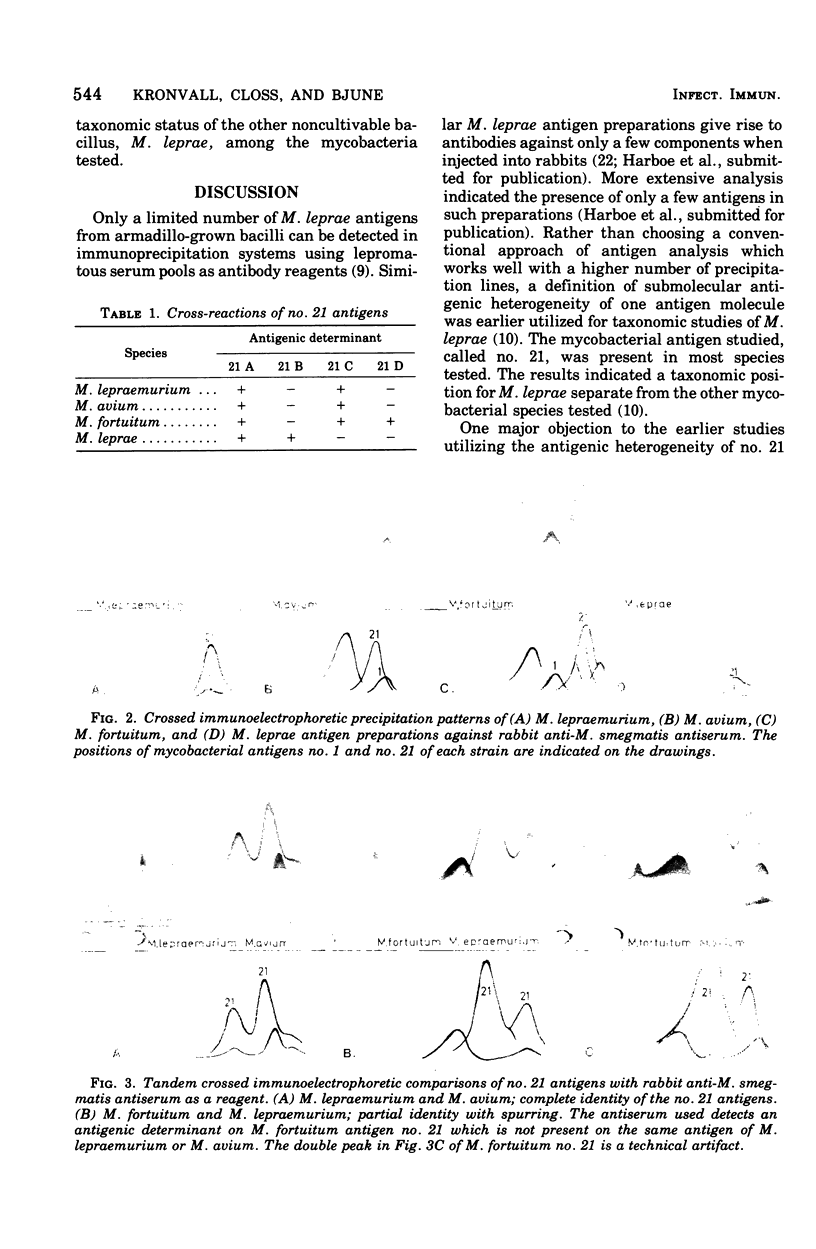
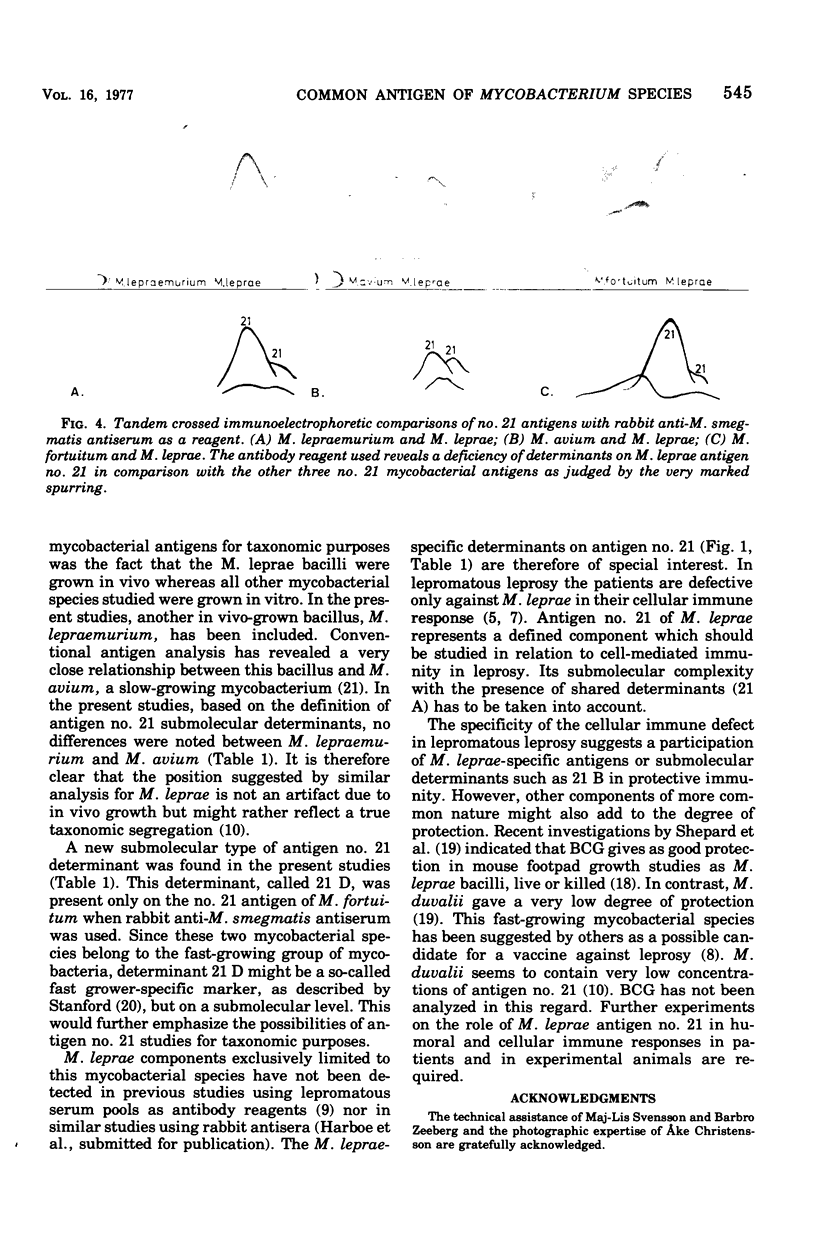
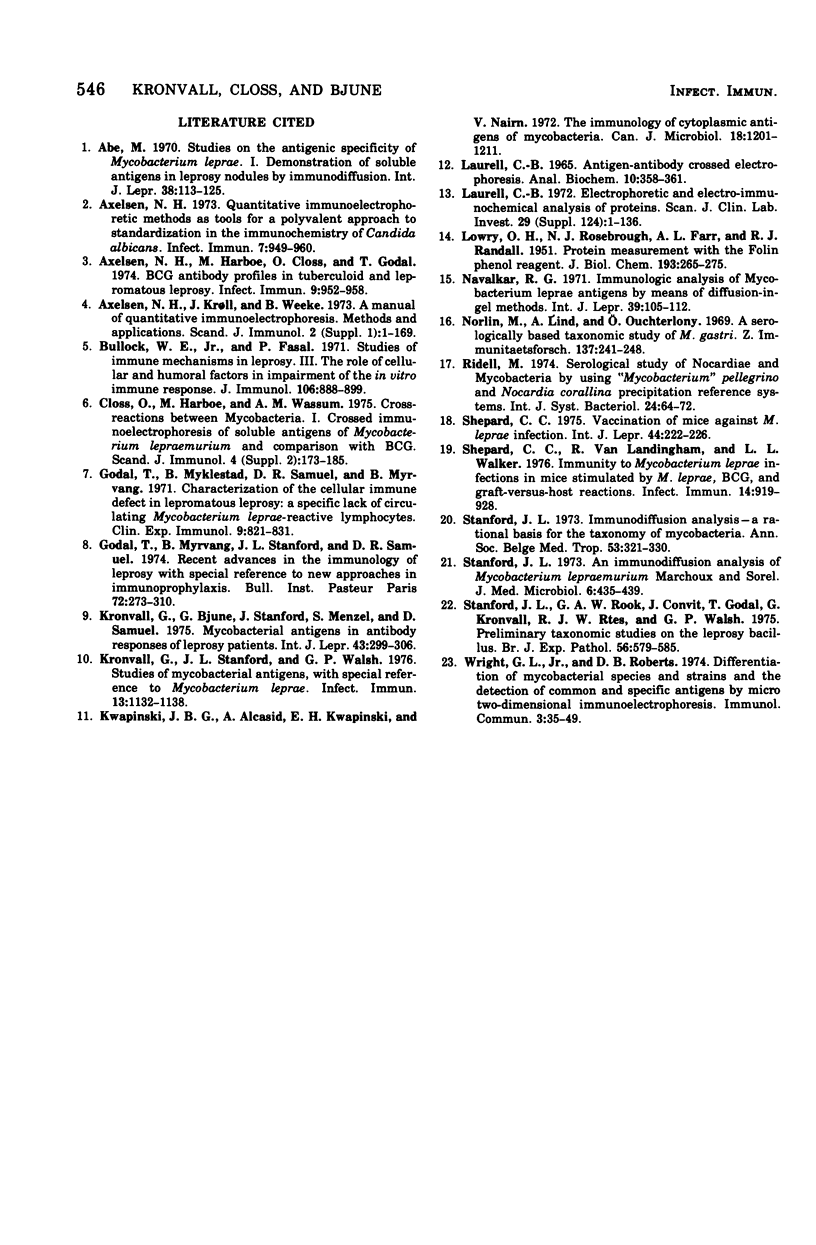
Images in this article
Selected References
These references are in PubMed. This may not be the complete list of references from this article.
- Abe M. Studies on the antigenic specificity of Mycobacterium leprae. I. Demonstration of soluble antigens in leprosy nodules by immunodiffusion. Int J Lepr Other Mycobact Dis. 1970 Apr-Jun;38(2):113–125. [PubMed] [Google Scholar]
- Axelsen N. H., Harboe M., Closs O., Godal T. BCG antibody profiles in tuberculoid and lepromatous leprosy. Infect Immun. 1974 May;9(5):952–958. doi: 10.1128/iai.9.5.952-958.1974. [DOI] [PMC free article] [PubMed] [Google Scholar]
- Axelsen N. H. Quantitative immunoelectrophoretic methods as tools for a polyvalent approach to standardization in the immunochemistry of Candida albicans. Infect Immun. 1973 Jun;7(6):949–960. doi: 10.1128/iai.7.6.949-960.1973. [DOI] [PMC free article] [PubMed] [Google Scholar]
- Bullock W. E., Jr, Fasal P. Studies of immune mechanisms in leprosy. 3. The role of cellular and humoral factors in impairment of the in vitro immune response. J Immunol. 1971 Apr;106(4):888–899. [PubMed] [Google Scholar]
- Godal T., Myklestad B., Samuel D. R., Myrvang B. Characterization of the cellular immune defect in lepromatous leprosy: a specific lack of circulating Mycobacterium leprae-reactive lymphocytes. Clin Exp Immunol. 1971 Dec;9(6):821–831. [PMC free article] [PubMed] [Google Scholar]
- Koch C., Nielsen H. E. Effect of anti light-chain antibodies on rat leukocytes in vitro. Scand J Immunol. 1973;2(1):1–8. doi: 10.1111/j.1365-3083.1973.tb02009.x. [DOI] [PubMed] [Google Scholar]
- Kronvall G., Bjune G., Stanford J., Menzel S., Samuel D. Mycobacterial antigens in antibody responses of leprosy patients. Int J Lepr Other Mycobact Dis. 1975 Oct-Dec;43(4):306–306. [PubMed] [Google Scholar]
- Kronvall G., Stanford J. L., Walsh G. P. Studies of mycobacterial antigens, with special reference to Mycobacterium leprae. Infect Immun. 1976 Apr;13(4):1132–1138. doi: 10.1128/iai.13.4.1132-1138.1976. [DOI] [PMC free article] [PubMed] [Google Scholar]
- Kwapinski J. B., Alcasid A., Kwapinski E. H., Nairn V. The immunology of cytoplasmic antigens of mycobacteria. Can J Microbiol. 1972 Aug;18(8):1201–1211. doi: 10.1139/m72-188. [DOI] [PubMed] [Google Scholar]
- LAURELL C. B. ANTIGEN-ANTIBODY CROSSED ELECTROPHORESIS. Anal Biochem. 1965 Feb;10:358–361. doi: 10.1016/0003-2697(65)90278-2. [DOI] [PubMed] [Google Scholar]
- LOWRY O. H., ROSEBROUGH N. J., FARR A. L., RANDALL R. J. Protein measurement with the Folin phenol reagent. J Biol Chem. 1951 Nov;193(1):265–275. [PubMed] [Google Scholar]
- Navalkar R. G. Immunologic analysis of Mycobacterium leprae antigens by means of diffusion-in-gel methods. Int J Lepr Other Mycobact Dis. 1971 Apr-Jun;39(2):105–112. [PubMed] [Google Scholar]
- Shepard C. C. Vaccination of mice against M. leprae infection. Int J Lepr Other Mycobact Dis. 1976 Jan-Jun;44(1-2):222–226. [PubMed] [Google Scholar]
- Shepard C. C., Van Landingham R., Walker L. L. Immunity to Mycobacterium leprae infections in mice stimulated by M. leprae, BCG, and graft-versus-host reactions. Infect Immun. 1976 Oct;14(4):919–928. doi: 10.1128/iai.14.4.919-928.1976. [DOI] [PMC free article] [PubMed] [Google Scholar]
- Stanford J. L. An immunodiffusion analysis of Mycobacterium lepraemurium Marchoux and Sorel. J Med Microbiol. 1973 Nov;6(4):435–439. doi: 10.1099/00222615-6-4-435. [DOI] [PubMed] [Google Scholar]
- Stanford J. L. Immunodiffusion analysis--a rational basis for the taxonomy of mycobacteria. Ann Soc Belg Med Trop. 1973;53(4):321–330. [PubMed] [Google Scholar]
- Stanford J. L., Rook G. A., Convit J., Godal T., Kronvall G., Rees R. J., Walsh G. P. Preliminary taxonomic studies on the leprosy bacillus. Br J Exp Pathol. 1975 Dec;56(6):579–585. [PMC free article] [PubMed] [Google Scholar]
- Wright G. L., Jr, Roberts D. B. Differentiation of mycobacterial species and strains and the detection of common and specific antigens by micro two-dimensional immunoelectrophoresis. Immunol Commun. 1974;3(1):35–49. doi: 10.3109/08820137409055744. [DOI] [PubMed] [Google Scholar]





